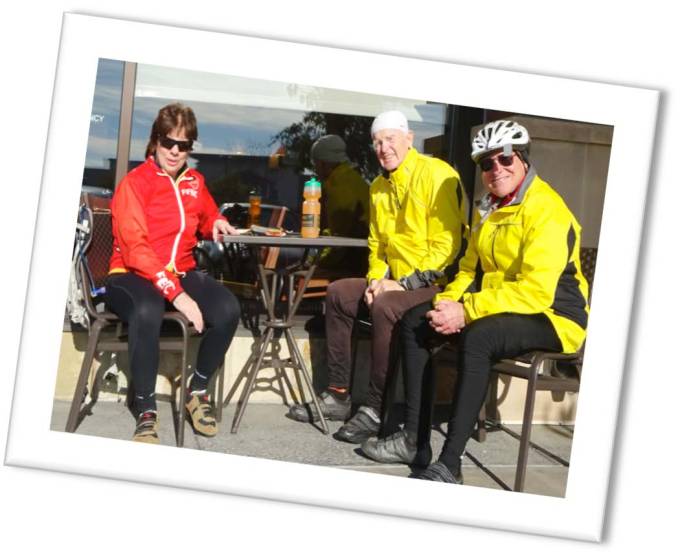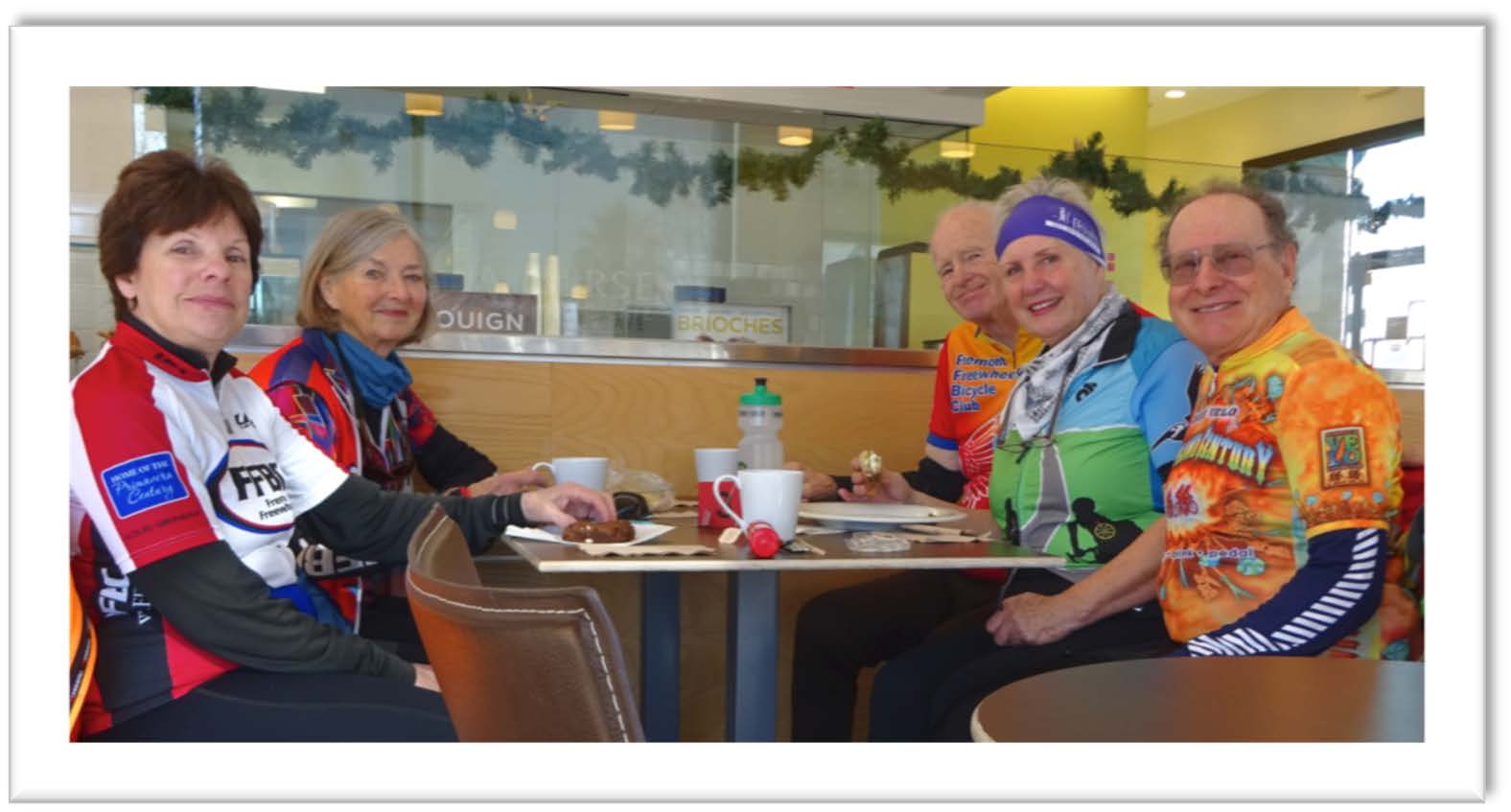Volume 44 , Issue 1 , January 2016
Photo and article submissions for each month’s e-Newsletter must reach Eve Ben-Ora (ffbc.newsletter@gmail.com) by the 20th of the month.
FFBC Gear – Get in the program
FFBC Logo Bike Clothing & Custom-made Clip-On Bike Mirrors: Jerseys ($52), windbreakers ($45), vests ($45), arm warmers ($20), headbands ($5), and DeFeet socks ($6) are available for sale. Mirrors ($10) adjusts to fit the earpiece of almost any glasses frame gives you a br oader field of view, and are guaranteed for life. These items can be purchased either at FFBC’s monthly meeting or by calling for an appointment at my home. Contact Terri Yi at clothing-sales@ffbc.org for clothing, and Molly and Neil Michelfelder (510) 797-6458 for mirrors.
oader field of view, and are guaranteed for life. These items can be purchased either at FFBC’s monthly meeting or by calling for an appointment at my home. Contact Terri Yi at clothing-sales@ffbc.org for clothing, and Molly and Neil Michelfelder (510) 797-6458 for mirrors.
For all of the latest updates about club activities, sit our website at www.ffbc.org.
 Reminder: Renew your membership
Reminder: Renew your membership
Membership in the FFBC is based on a calendar year, which means, in order to be a member on January 1, 2016, you need to renew your membership now.
You can enroll/renew online or you can send your membership form and payment to the FFBC PO box: PO Box 1868 in Fremont 94538. When you renew online … it’s so easy … you’ll have the opportunity to pay using PayPal or you can fill out the form using the online option and then send your check to the FFBC PO Box.
Do it today and you’ll be set for riding in 2016. You will get your membership card in an email in early January.
Making a Move?
Please notify Becky Denevan membership@ffbc.org
THANKS TO THE DECEMBER RIDE LEADERS
Garry Birch, Al Quintana, Amy Giles, Prashant Singh, Jay Gilson, Conni Smith, Ken Goldman, Lori Sommer, West Kurihara, Joyce Tanaka, Vanessa McDonnell, David Walker, Robin O’Hara, Julia Walker, Tim O’Hara &Terri Yi
The Frozen 3 of the Tuesday, Dec. 29, 2015, Show ‘n Go enjoying a sunny spot at Panera’s in Pacific Commons.

From the left: Sydney Friedenberg, Lambert Caulfield, and Jon Graff.
Primavera Century
This event sells out quickly. Registration fees are discounted in December and raise monthly after that. There is also a discount for teams of 8 or more. See www.ffbc.org/primavera for details.
How Cycling Makes Us Smarter
It’s no secret that cycling makes you fitter. Research shows that it also sharpens your thinking and melts away stress. Here’s how to maximize the cognitive benefits cycling.
- selene yeager March 31, 2014
EVERY morning Canadian neuroscientist Brian Christie, PhD, gives his brain an extra boost. We’re not talking about tossing back multiple strong shots of espresso or laying one of those mind-training games advertised all over Facebook. “I hop on my bike, go to the gym for 45 minutes, then ride the rest of the way to work,” says Christie. “When I get to my desk, my brain is at peak activity for a few hours.” After his mental focus sputters to a halt later in the day, he jump-starts it with another short spin to run errands.
Ride, work, ride, repeat. It’s a scientifically proven system that unleashes some unexpected benefits of cycling. In a recent study in the Journal of Clinical and Diagnostic Research, scientists found that people scored higher on tests of memory, reasoning, and planning after 30 minutes of spinning on a stationary bike than they did before they rode. They also completed the tests faster after pedaling.
Exercise is like fertilizer for your brain. All those hours spent turning your cranks create rich capillary beds not only in your quads and glutes, but also in your gray matter. More blood vessels in your brain and muscles mean more oxygen and nutrients to help them work, says Christie.
When you pedal, you also force more nerve cells to fire.
As these neurons light up, they intensify the creation of proteins like brain-derived neurotropic factor (BDNF) and a compound called noggin (yes, really), which promote the formation of new brain cells. The result:
You double or triple the production of neurons—literally building your brain, says Christie. You also release neurotransmitters (the messengers between your brain cells) so all those cells, new and old, can communicate with each other for better, faster functioning. That’s a pretty profound benefit to cyclists. This kind of growth is especially important with each passing birthday, because as we age, our brains shrink and those connections weaken. Exercise restores and protects the organ, says Arthur Kramer, PhD, a neuroscientist at the University of Illinois at Urbana-Champaign. “Our research finds that after only three months, people who exercised had the brain volume of those three years younger,” says Kramer, referring to a study that examined the brains of 59 sedentary volunteers between the ages of 60 and 79 who either did an exercise program or were inactive for six months. A bigger, more connected brain simply works better. “Adults who exercise display sharper memory skills, higher concentration levels, more fluid thinking, and greater problem-solving ability than those who are sedentary,” says Kramer.
So if a little exercise boosts your mental acumen, will going longer and harder earn you Mensa membership? Not so much, says Christie. More isn’t always better, especially in the short term, he says. The same study that reported brain benefits from a short exercise session also revealed that more intense efforts can temporarily compromise memory and information processing, something Christie has seen firsthand.
Christie’s teenage daughter also starts her day with exercise— specifically rowing practice, usually with searing interval sets. But instead of leaving her brain firing on all cylinders, the workout leaves her a little stalled out when she arrives at school. “Short term, you’re on a U-shaped curve for exercise and mental benefits,” says Christie. “Too little and your brain doesn’t get what it needs to work optimally. Too much and your body has sapped the glucose and other resources it needs, so it’s hindered until it recovers.” The sweet spot for sharp mental acuity right after exercise is about 30 to 60 minutes of aerobic riding at roughly 75 percent of your maximum heart rate, or an effort of 7 on a scale of 1 (standing still) to 10 (going all out). (Mr. Xerty)
Positive Spin
Of course, there’s a lot more to mental fitness than just improving your smarts. Plenty of science backs the idea that a good ride can also have emotional benefits. Cycling can elevate your mood, relieve anxiety, increase stress resistance, and even banish the blues.
“Exercise works as well as psychotherapy and antidepressants in the treatment of depression, maybe better,” says James Blumenthal, PhD, professor of behavioral medicine in the department of psychiatry and behavioral sciences at Duke University in Durham, North Carolina. A recent study analyzing 26 years of research finds that even just some exercise—as little as 20 to 30 minutes a day—can prevent depression over the long term.
At the moment, scientists don’t completely understand the exact mechanisms, but they do know that one of the benefits of cycling is that it boosts the production of feel-good chemicals such as serotonin and dopamine. “As soon as our lab rats start running on their wheels, they get a 100 to 200 percent increase in serotonin levels,” says J. David Glass, PhD, a brain-chemistry researcher at Kent State University in Kent, Ohio.
HOW CYCLING MAKES US HAPPY
The authors of a recent review study on exercise and depression came up with the following guidelines to ward off the blues with aerobic exercise: Do three to five
sessions a week. Each session should be 45 to 60 minutes long and keep your heart rate between 50 and 85 percent of your max. Of course, that’s just a minimum recommendation aimed at the general public. You can
go ahead and ride to your heart’s—and mind’s—content. Tags: Training; FitnessBrain
Copyright © 2016 Rodale Inc.
Tuesday, Dec. 15, 2015, FFBC Show ‘n’ Go – Anderson’s Bakery, Union City

From the left: Sydney Friedenberg, Donna Boomershine, Lambert Caulfield, Randy Fewel, and Jon Graff
Tuesday, Dec. 1, 2015, FFBC Show ‘n’ Go at Kaffa Coffee
From the left: Lambert Caulfield, Lori Sommer, Donna Boomershine, Sydney Friedenberg, and Jon Graff
The Future of Cycling
Santa brought Dylan a bike (from Centripedal). Now he can ride with his grandmother, Randy Fewel. His mom, Suzanne, has signed up for the Cinderella training. An FFBC cycling family!
Bike Race Officials Training Class – Saturday January 30, 9:00 AM
Did you know there are over 100 bike races annually in Northern California? In addition to racers participating, trained officials are also needed. Northern California Nevada Cycling Association (NCNCA) offers a class for anyone interested in becoming a USA Cycling Official.
Saturday January 30, starting at 9:00AM at the Courtyard Marriott, 2929 Constitution Drive, Livermore.
The meeting room will open at 8:00 AM and the coffee shop will be open. The class starts promptly at 9:00 AM, so please allow enough time to arrive, sign in and get ready.
NCNCA needs people to help score and officiate races. The training includes the class along with the opportunity to learn with experienced mentors and lots of on-the-job training. You don’t have to memorize the rulebook or be an expert in everything, all that is needed is a willingness to learn and a love of bike racing. After taking this class and progressing through a short internship, officials are paid to help put on races.
If you are a member of a USA Cycling team, your team’s membership for 2016 includes a free official’s license. Please talk to your club about taking advantage of that opportunity.
Newsletter Team
Eve Ben-Ora
![]()


Leave a Reply
You must be logged in to post a comment.